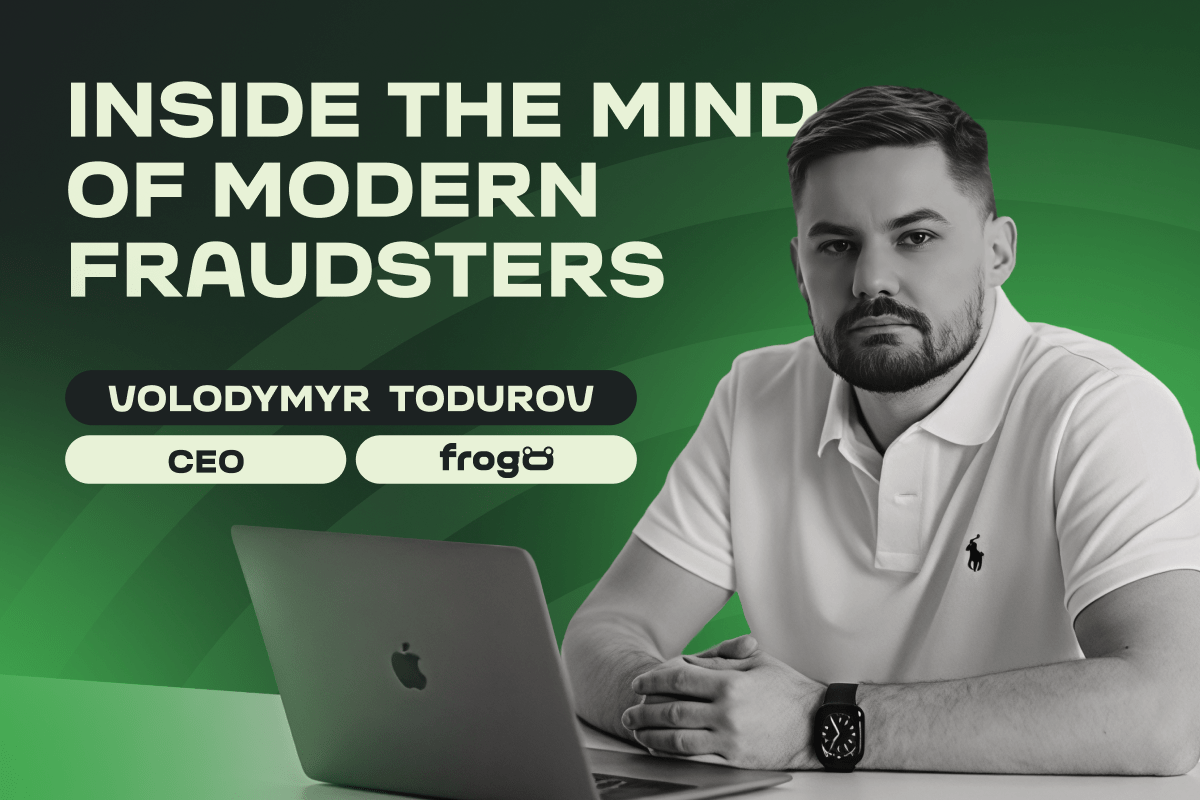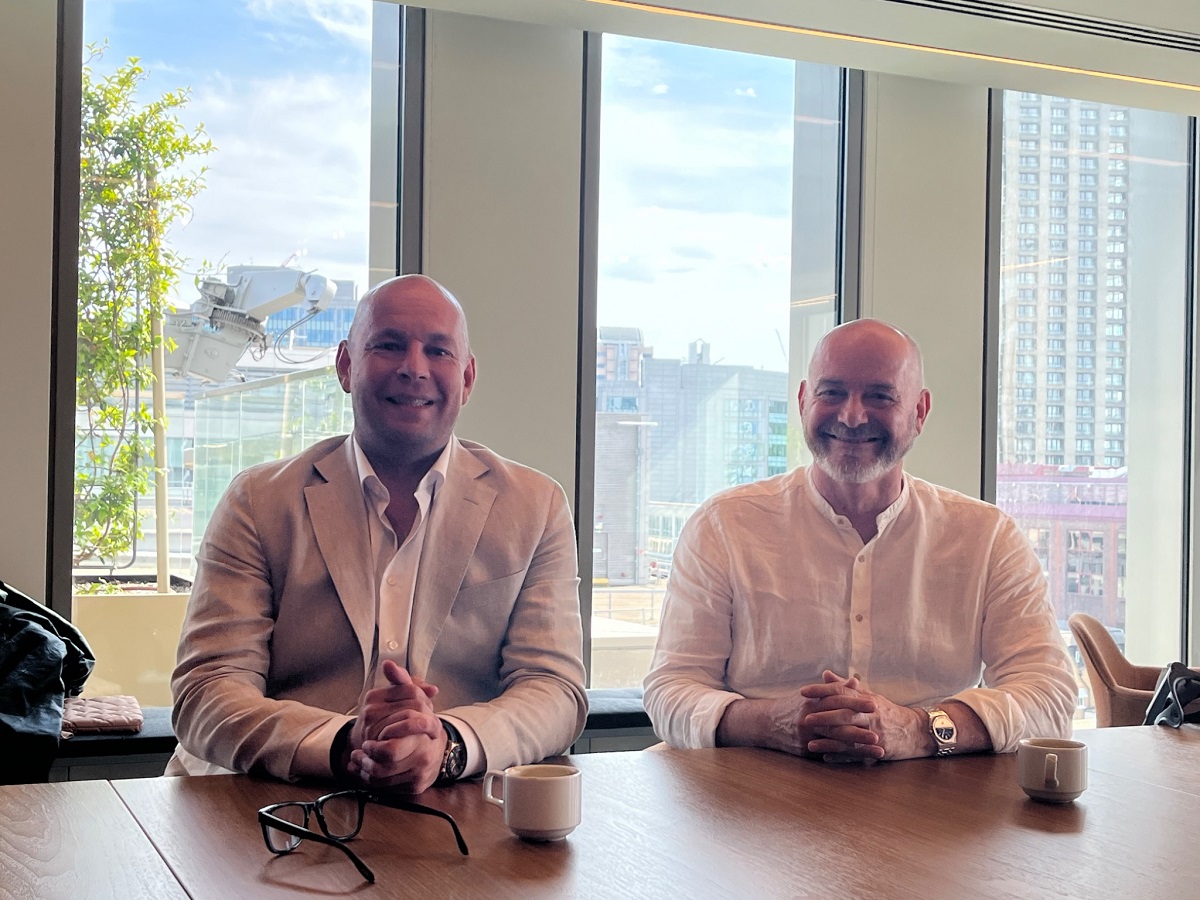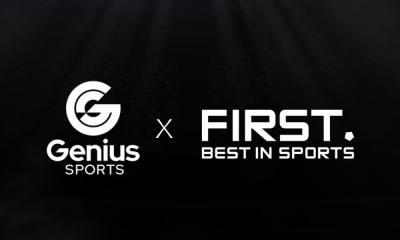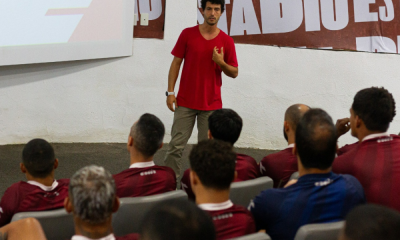Interviews
Personalisation in sportsbook roundtable

Leonid Pertsovskiy, Chief Executive Officer at Betby
If the pandemic has taught us anything about the current landscape of sportsbetting, it is that immersive experiences that facilitate modern requirements and short attention spans are becoming essential to survival. With the space becoming increasingly saturated with similar offerings and products, creating a more engaging user journey is key to standing out and ultimately retaining business.
How have you pivoted your offering to facilitate modern customer preferences? Or is it a case of ‘it if ain’t broke, don’t fix it’?
At Betby, we have done a lot over the past couple of years to adjust our sportsbook to the unique preferences of modern users, even though the general needs and requirements have remained consistent over the past five, or even ten years. The end user still wants to see their favourite events on a platform, as well as less distractions, higher limits, and instant bet settlement, and our sportsbook offering has evolved over the years to facilitate these preferences and attract a broader demographic of user.
Nowadays, our platform features high-quality content, including markets on more than 90 traditional sports, major tournament that stretch across the globe, an impressive selection of esports and virtual sports events, and the cherry on the cake: our proprietary Betby.Games range.
The remarkable variety of our offering is what helps us to stand out from the crowd and engage new users. A year ago, nobody could have predicted that we would be able to offer Kabaddi, Golf and Formula 1 live to our audiences, but our sportsbook has really opened up avenues to the rest of the world in a drive to provide followers of all sports with suitable markets, and live odds. It is important to be flexible to satisfy client needs, while offering same level of adaptation when talking about risk-management, localisation strategies, and promotional campaigns. Investing in flexibility means investing in long-term stability and adjusting to the post-pandemic sportsbook landscape.
We’re seeing plenty of changes in user behaviour and betting patterns, led by a surge in ‘in-play’ betting, Prop Bets, and Bet-Builder tools. What are you doing to capitalise on this phenomenon?
We’ve certainly played with the idea of dividing up old-school audiences from the newcomers, due to the differences in their behaviours. We understand experienced punters don’t particularly enjoy new features or innovation within sportsbook, and therefore require a simplified layout and interface that they can relate to, while on the other side of the spectrum, new users enjoy being met with an abundance of new technologies and products thanks to their pursuit of instant gratification.
Our recent focus has been on boosting gamification and the social aspects of our sportsbook, which aligns neatly with modern user requirements, such as needing consistent entertainment and various aspects of interaction in their experiences.
Have any innovations in the sportsbetting space have caught your attention?
We see a lot of innovations in the field of data analysis and recommendation systems where reporting and business intelligence (BI) tools have become more integral, and the times of buying market share with traffic investments are over. Our clients see just how easily and effectively they can optimise their marketing budgets using our BI analytics system, and this is exciting for both us and them.
Another innovation that we have started to see more of this past year is contests being created occurring between passionate sport followers. While casino tournaments have existed for the best art of a decade now, sportsbook was always seen as less capable of supporting engaging competitions, especially between punters, which is why we recently introduced a sportsbook tournaments engine, which has shown fantastic results.
With the worlds of esports and sports betting blending at an unprecedented rate, is it time that esports merits its own tab in a sportsbook?
Yes, absolutely. Esports has an entirely different audience to regular sports, as well as a distinct streaming-centric user interface, and even a different approach to risk-management in sportsbook and marketing strategy.
Esports as a vertical is very much here to stay, and competitions are extremely popular when it comes to the betting experience that surrounds their unique events, with passionate fans that enjoy placing a wide selection of bets on them. It is a very rare for a user to follow both traditional sports as well as esports, let alone combine the two in one betslip, and for this reason it should have its own tab that is managed differently to the classic sportsbook. Esports is an entirely different space to that of traditional sports, and with interaction between players and esports followers occurring in so many ways, it needs to be respected as a phenomenon.
Bobby Longhurst, Managing Director at Sportingtech
If the pandemic has taught us anything about the current landscape of sports betting, it is that immersive experiences that facilitate modern requirements and short attention spans are becoming essential to survival. With the space becoming increasingly saturated with similar offerings and products, creating a more engaging user journey is key to standing out and ultimately retaining business.
How have you pivoted your offering to facilitate modern customer preferences? Or is it a case of ‘it if ain’t broke, don’t fix it’?
We’re constantly evolving and catering our offering not only to new customer types but to specific markets. Rather than resting on our laurels, we’re consistently dedicated to incorporating new ideas and solutions into the Sportingtech Quantum platform. Attention to detail is imperative; if the customer believes there has been a lack of effort in the offering put before them, the overall success of the operation will be jeopardised. Localisation, and by extension player profiling, is what sets an offering apart from the competition, and this is something that Sportingtech prioritises – most prominently displayed in our proprietary Popular Bets and Popular Events widgets. In today’s industry, the idea that a one-size-fits-all solution can be offered is one that just doesn’t stand up. Our Quantum platform also has modularity at its core, and this is something that can’t be overlooked – if operators are handed the reins, they can personalise their own offering and subsequently make the experience better for the end user.
We’re seeing plenty of changes in user behaviour and betting patterns, led by a surge in ‘in-play’ betting, Prop Bets, and Bet Builder tools. What are you doing to capitalise on this phenomenon?
The rising prominence of these new kinds of betting is clear to see, but this relatively new environment can be a confusing place to navigate for newcomers. Sportingtech’s Bet Assist offering is ideally placed, making traversing platforms more straightforward for players – it generates automated betting tips based on historical data, live-score and AI analysis, covering both pre-match and in-play markets across seven sports and with complete bet slip integration, and has been proven to increase user engagement, retention and turnover rates. In addition, our FastBet solution, which enables users to wager multiple single bets across all sports at the touch of a button without creating a betslip, is the only feature of its kind on the market. Players are likely to place more bets than they usually would with a standard betslip.
Have any innovations in the sports betting space caught your attention?
Sports betting is a hub of innovation, and our Popular Bets and Popular Events widgets are testament to this. They allow operators to display a particular market’s current top-10 bets and top-10 events, automatically refreshing every five minutes. Offering our operator customers a localised, intuitive way to immediately boost engagement is extremely gratifying. With minimum effort on the operators’ part, they can be confident that their players are constantly being shown the most popular bets and events at any one time. Our priority is to provide flexibility of use, allowing operators to display the bets and events on different areas of their sites while also being optimised for mobile and desktop. It is important that they auto-populate according to the operators’ markets, which has gone a long way to making this the hassle-free and personalised engagement tool we set out to make.
With the worlds of esports and sports betting blending at an unprecedented rate, is it time that esports merited its own tab in a sportsbook?
Sportingtech’s authority in Latin America is well documented, and we are seeing that esports’ popularity in these markets is on a steep upward trajectory. New opportunities frequently arise in emerging markets for the introduction of new verticals, and our platform offers a quick and easy way to market, offering the very best of what esports has to deliver. Bettors in LatAm markets have fallen in love with esports and its popularity looks set to continue to grow – esports will certainly merit its own place in a sportsbook if this trend continues.
Suren Khachatryan, founder and CEO of Technamin
If the pandemic has taught us anything about the current landscape of sports betting, it is that immersive experiences that facilitate modern requirements and short attention spans are becoming essential to survival. With the space becoming increasingly saturated with similar offerings and products, creating a more engaging user journey is key to standing out and ultimately retaining business.
How have you pivoted your offering to facilitate modern customer preferences? Or is it a case of ‘it if ain’t broke, don’t fix it’?
Innovation is one of the cornerstones of Technamin. We could have easily stuck with the traditional approach to a sportsbook, but we decided to take things a step further and develop a sportsbook that is ideally suited to the needs of both operators and bettors. The “if it ain’t broke, don’t fix it” philosophy may apply to all sportsbooks, as their functionalities are by and large the same. However, it’s the approach that differs. Our approach is to create a product that is easily customisable to each partner’s preference and offers each end user a personalised sports betting experience.
We’re seeing plenty of changes in user behaviour and betting patterns, led by a surge in ‘in-play’ betting, Prop Bets, and Bet Builder tools. What are you doing to capitalise on this phenomenon?
With the development of technology and innovation, users are displaying a decreased attention span. Therefore, the majority of players prefer matches with rapid changes and easy solutions. Technamin works hard to provide the maximum amount of live matches and in-play betting throughout the year with the most reliable odds. Our professional team of traders and risk managers make sure we provide the most accurate data to our partners. Bet Builder and Prop Bets are the other tools that make the players’ journey more enjoyable and multifunctional. These are the features that our team continually develops.
Have any innovations in the sports betting space caught your attention?
I think we are living in the best of times when it comes to innovation in sports betting. We are very keen on how crypto payments are going to evolve in the sector. These currencies are already taking the industry by storm, and things are only going to progress from there. Another feature we are very excited about is the addition of VR and augmented reality technology that is going to create a more immersive experience for the end user. Overall, every technological innovation is exciting because it can be a gateway to something breathtaking.
With the worlds of esports and sports betting blending at an unprecedented rate, is it time that esports merited its own tab in a sportsbook?
Certainly so. Regardless of where each of us stands in the “are esports real sports?” debate, the facts clearly show that esports are here to stay and are popular when it comes to the betting experience. The fans are passionate about them and love to bet on the events. It’s just another fresh and innovative side of sports betting that we must embrace and build on. And the growing demand is something that operators must meet if they wish to maintain their popularity in the industry. Of course, we at Technamin are here to help with that!
Powered by WPeMatico
Baltics
HIPTHER Community Voices: Interview with the CEO and co-founder of Nordcurrent Victoria Trofimova

In this edition of HIPTHER Community Voices, we talk with Victoria Trofimova, the CEO and co-founder of Nordcurrent, the biggest game studio to come out of Lithuania and the Baltics. Since starting the company in 2002, Victoria has led Nordcurrent from a small team to an international gaming success story — all without external funding.
She shares how key decisions like focusing on mobile games, building a diverse team, and staying true to their creative vision helped shape Nordcurrent’s growth. We also dive into how she’s helping put the Baltics on the global gaming map, supporting young talent, and what advice she has for the next generation of women leaders in tech.
Nordcurrent has grown into a Baltic powerhouse since its founding in 2002. What were some of the pivotal moments that shaped the studio’s identity and success—especially as a bootstrapped company?
One key moment was our decision to focus fully on mobile gaming early on. That shift, around 2010, allowed us to scale globally with titles like Cooking Fever, which became a long-term success story. Another pivotal step was building and retaining in-house capabilities, from development to marketing, while staying self-funded. Being bootstrapped taught us discipline, resilience, and how to make bold yet thoughtful decisions without external pressure.
You’ve scaled a 360-person team across multiple countries. What have been the biggest challenges—and advantages—of growing Nordcurrent without external funding?
The biggest challenge has been growth pacing. We had to build sustainably, without shortcuts. But that’s also been our advantage; we’ve kept creative control, built long-term trust with our team, and stayed focused on profitability and product quality. It’s a different rhythm, one that favors deep thinking over hype.
Diversity in gaming is still lagging behind. What concrete steps has Nordcurrent taken to drive inclusion, and how do you embed this into studio culture, hiring, and leadership?
We don’t overcomplicate it, we hire the best people who want to build great games with us. We don’t separate or label by gender, background, or title. If someone brings talent, drive, and a collaborative mindset, they belong here. That approach has naturally led to a diverse team, including strong female leadership across departments. We focus on creating an environment where everyone is treated equally, trusted, and heard.
You’ve spoken about attracting global talent to Lithuania and the Baltics. What makes the region appealing—and what misconceptions do you often have to overcome when recruiting internationally?
The Baltics offer a great work-life balance, strong tech ecosystems, and a tight-knit creative scene. But we still need to overcome outdated perceptions; for example, that it’s cold, isolated, or lacking opportunity. The truth is, Vilnius and other cities here are dynamic and are increasingly being recognized for innovation.
In such a saturated gaming market, how does Nordcurrent approach innovation and stay relevant without falling into trend-chasing?
We listen deeply. To players, to data, and to our instincts. With over two decades of experience, we’ve built a rich internal library of what works, what lasts, and what connects. Innovation for us isn’t about reinventing the wheel every time. It’s about layering insight, emotion, and cultural nuance onto strong foundations. We don’t chase trends, we ask how a game fits into people’s lives. That’s why titles like Airplane Chefs resonate. They’re familiar yet fresh, culturally rich but globally accessible. Years of learning has given us the confidence to trust our gut and the clarity to know when to try something bold.
From mobile hits to console and PC publishing—how has your portfolio strategy evolved, and how do you decide what kinds of games to invest in today?
Our mobile success gave us the freedom to diversify. With Nordcurrent Labs, we now publish PC and console games that align with our values: original IP, strong storytelling, and long-tail potential. We look for teams with vision and grit, whether it’s cozy games or narrative-rich adventures.
You recently acquired River End Games and the Cinemaware catalog. What’s the strategic thinking behind those moves, and what can players expect from these legacy properties going Forward?
River End Games brings deep narrative talent and AAA craftsmanship, which complements our publishing ambitions. With Cinemaware, we’re reimagining classics for a new generation. These acquisitions aren’t about nostalgia only, they’re about unlocking untapped creative value in ways that feel both respectful and bold.
How are you helping to nurture the next generation of game developers in the Baltics, and what role do you think studios should play in education or early talent development?
We take this responsibility seriously. As the largest Lithuania-born game developer, we feel a strong duty to help grow the industry, not just our studio. We actively collaborate with the Lithuanian Game Developers Association, support local game jams, and organize major meetups that bring the community together. Our goal is to make the gaming industry more visible, more accessible, and more appealing, especially to young people who may not yet see it as a real career path.
It’s not just about hiring talent, it’s about helping to create it. We believe studios should take an active role in popularizing the industry, opening doors, and building a future where game development is seen as a creative and respected profession.
You’re leading a company that’s rooted in Eastern Europe but competing on a global stage. How do you balance local values with global ambitions?
We don’t see it as a conflict. Our roots give us authenticity and resilience, and these are qualities that resonate globally. We build games that are grounded in strong craft and cultural richness but are universally relatable. Staying true to who we are has been our best strategy for going global.
And finally—what advice would you give to aspiring women leaders in tech and gaming who want to break into this industry and rise through the ranks?
Own your voice. You don’t need to fit a mold to lead. Surround yourself with people who challenge and support you. And remember, leadership isn’t just about a title, it’s about taking responsibility, lifting others, and staying curious. Tech and gaming need your perspective, and there’s room for you at the table.
The post HIPTHER Community Voices: Interview with the CEO and co-founder of Nordcurrent Victoria Trofimova appeared first on European Gaming Industry News.
Interviews
Portrait of a Fraudster Then and Now: How Scammers’ Habits and Tactics Are Changing

Fraud in the iGaming sector is no longer the work of lone opportunists. Today’s scammers operate in well-organized, tech-savvy networks – quietly exploiting systems that weren’t built to catch them. And as the digital economy grows, so too does the complexity of fraud schemes targeting gaming operators.
Amid this evolving threat landscape, Frogo has emerged as a company redefining how fraud prevention should work. We spoke with Volodymyr Todurov, CEO at Frogo, to get an inside look at how fraudsters are changing their tactics – and what operators can do to stay ahead.
Fraudsters evolve fast – how does your system stay one step ahead without overwhelming teams with false alarms?
Absolutely, the landscape of fraud is constantly shifting and staying ahead requires more than static rules. At Frogo, we’ve developed a dynamic system that adapts in real-time to user behavior and transaction contexts. Our platform learns from both fraudulent and legitimate activities, enabling it to distinguish between the two more effectively. This approach reduces false positives and ensures that our clients’ teams can focus on genuine threats without being bogged down by unnecessary alerts.
Can you walk us through a real-world case where your platform uncovered a fraud scheme traditional tools missed?
Absolutely. One notable case involved a large-scale bot attack targeting SMS-based fraud vectors. Initially, our standard device ID-based defenses helped neutralize the first wave of the attack. However, the adversaries quickly adapted, altering their emulation tactics to bypass traditional checks. At that point, conventional methods were no longer sufficient to detect the evolving fraud.
We responded by implementing a dynamic anomaly detection framework. This involved redefining detection signals in real-time using IP intelligence and deep device fingerprint attributes – areas where our proprietary data collection algorithms provided a significant edge. By anchoring detection logic to more granular and resilient signals, we were able to recalibrate thresholds dynamically, ensuring legitimate users weren’t impacted.
The results were decisive: bot attack efficiency dropped sharply from over 80% to just 3.5%.
What’s something about fraud detection that most businesses get wrong? And how does Frogo challenge that?
A common pitfall we see is operational rigidity – many businesses rely on static rules and general-purpose triggers that result in high false positive rates. This not only burdens anti-fraud teams with unnecessary manual reviews but also degrades the experience for legitimate users, especially loyal or VIP customers.
For example, it’s typical to see blanket rules like “manually verify all payouts over X euros.” While that may seem prudent, in reality it’s inefficient. It overlooks low-value, high-frequency fraud – such as bonus abuse – and disproportionately flags legitimate high-value players.
At Frogo, we take a different approach. Our system adapts rules dynamically based on customer behavior and segmentation. A trusted VIP user with a long-standing reputation shouldn’t be reviewed multiple times a day. But if a wave of new €5 accounts starts exhibiting bonus-hunting behavior, they should run immediate scrutiny – regardless of transaction size.
By aligning detection logic with behavioral context and player reputation, we reduce noise, increase fraud catch rates, and protect real users from unnecessary friction.
How does Frogo automate risk logic without sacrificing the flexibility businesses need to reflect their unique policies and traffic patterns?
At Frogo, we don’t see automation and customization as opposing forces – they operate in different dimensions. Our focus is on automating the customization of risk and scoring policies in a way that respects each client’s specific risk appetite and user behavior.
We achieve this through dynamic triggers. Rather than hardcoding arbitrary rules – like “five failed top-ups per minute equals fraud” – we apply adaptive scoring thresholds that align with real-world usage patterns.. For example, our system might detect that, for a certain payment method and user segment, more than 1.3 failed top-ups per minute is statistically anomalous – because it exceeds the 98th percentile of historical behavior.
But that same trigger adjusts automatically. If the next day a payment provider experiences a technical issue and normal users start retrying more often, the threshold might shift to 2.7. What was anomalous yesterday may no longer be today – and our system adapts accordingly to reflect evolving traffic patterns.
As a result: the clients retain full control over their risk strategy, while Frogo ensures their policies scale efficiently, adapt in real time, and minimize false positives – even in volatile traffic conditions.
Beyond detection – how does Frogo help companies investigate and understand fraud at a strategic level?
Detection is just the beginning. Frogo’s graph-based forensic tools and AI models provide a comprehensive view of the relationships between accounts, transactions and behaviors. This allows companies to identify patterns and vulnerabilities that might not be apparent through traditional analysis. Our analytics layer offers insights into trends and forecasts, enabling businesses to understand the broader context of fraudulent activities and make informed strategic decisions to mitigate future risks.
Fraud might be getting smarter, but so are the solutions built to fight it. Platforms like Frogo are helping operators move beyond reactive security measures and into a space of strategic, data-informed defense. In an industry where trust is everything, that shift might just be the difference between staying one step ahead – or falling behind.
Disclaimer: Frogo’s fraud prevention solutions are developed in full compliance with applicable data protection laws, including GDPR. All behavioural analysis is performed on anonymised or aggregated data, with full transparency and control provided to our clients.
The post Portrait of a Fraudster Then and Now: How Scammers’ Habits and Tactics Are Changing appeared first on European Gaming Industry News.
Interviews
Inside the Matrix: A Conversation with EveryMatrix Founders on Europe, Expansion, and Staying Hands-On

By Maria Emma Arnidou, Event Marketing Director at HIPTHER, for the European Gaming Media
During the recent EveryMatrix Media Day at the company’s opening of their new London office, Co-Founders Ebbe Groes (CEO) and Stian Hornsletten sat down with press to share key insights into their strategic vision. In this exclusive Q&A, we explore their views on the European Market, the evolution of EveryMatrix’s business model, leadership philosophy, and the company’s experience in the ever-evolving U.S. market.
Europe is filled with local heroes. It’s far more fragmented than most people think.
You discussed emerging markets in your presentation. What about Europe – is it considered saturated, or are there still areas of growth?
Ebbe Groes: I really don’t think Europe is saturated at all. In fact, big parts of it are still underdeveloped. Take France for example, it doesn’t allow online casino. Germany has effectively banned it. That’s two of Europe’s three largest economies where casino is either outlawed or nearly impossible. So yes, there is still plenty of room for growth.
Stian Hornsletten: And the market is getting more concentrated around a few bigger players, but even then, it’s not as centralized as in the U.S.
Ebbe Groes: Exactly. Europe is filled with local heroes. You won’t find many players dominating across the board. Kindred, Betsson – they’re strong, but when you go country by country and look at market share, the picture is very fragmented. Even with the economies of scale in marketing – say you sponsor a Premier League team – you’re still not getting the full return unless you’re present across multiple markets. That’s what makes Europe so different from the U.S., where a few big players hold all the cards.
We started with a sportsbook. Now we’re building an ecosystem.
EveryMatrix today operates across multiple verticals with a deeply diversified portfolio. Was this the vision from the start, or did it evolve as the company grew?
Stian Hornsletten: The vision definitely evolved quickly as we grew. We started with OddsMatrix, a B2B sportsbook product that was meant to be an off-the-shelf, managed solution – something that didn’t exist back then. Within a year, we had already expanded into turnkey and PAM solutions. By 2010–2011, we had launched the CasinoEngine and started specializing in product verticals.
We’ve always been very innovation-driven. We keep developing new products – some of which are still under wraps – and R&D remains one of the most exciting parts of what we do. Today, most of our top 10 clients are turnkey. While we still offer standalone modules, our growth has come from cross-vertical synergy.
Despite this scale and complexity, you both remain deeply involved in the company’s day-to-day operations. How do you manage to stay on top of everything across products, people, and processes?
Ebbe Groes: It helps that we’ve been here from the start. I wouldn’t want to be hired into this role now and try to learn everything from scratch – but I’ve had 18 years to absorb it all. We’ve built the company in a way that each vertical operates almost like its own business. For example, the sports division has its own CTO, product team, trading team, and even its own support function. That independence gives us breathing room.
It allows me to focus on high-level strategy, like acquisitions – take FSB, for instance. That required a lot of focus at the start, but eventually it will transition into the core business and require less direct involvement.
Stian Hornsletten: Over the years, we’ve also developed strong planning, reporting, and KPI structures across the business. That consistency makes it easier to monitor everything and integrate new divisions. Whether we open a new office or onboard a new team, we already have the systems in place to support them.
Ebbe Groes: And the same goes for finance and HR. When we opened the London office, the HR team already knew how to handle it – we’d opened three the year before. That kind of maturity allows us to move fast without creating chaos.
“In Europe we have 150 competitors in content; in the U.S., maybe 10.”
And what about the U.S. – a market many see as the holy grail of iGaming? What’s your current position there?
Ebbe Groes: To be honest, the U.S. was a tough lesson. We entered hoping to provide a full turnkey solution, but the market didn’t evolve the way we expected. Many well-funded B2C operators pulled out, and that left little demand for companies like us to offer the full stack. We pivoted to focus on one thing: our own gaming content.
Stian Hornsletten: We’re now live in four out of five regulated U.S. states for our own content, and we have agreements with all the major operators. Some new games from SlotMatrix are set to launch by summer, and they’ve already shown strong performance elsewhere – which gives us hope. If we manage to capture even 1–2% market share with our own content, that would already be meaningful.
But it’s been a long and costly process. Every state has its own regulatory requirements, separate hosting, and certification needs. And if one state’s not ready, operators won’t promote your games nationally. It’s frustrating, but it also reduces competition. In Europe we have 150 competitors in content; in the U.S., maybe 10. So if we can endure, there’s long-term potential.
The post Inside the Matrix: A Conversation with EveryMatrix Founders on Europe, Expansion, and Staying Hands-On appeared first on European Gaming Industry News.
-

 AGCO7 days ago
AGCO7 days agoAGCO Fines Great Canadian Casino Resort Toronto $350,000 for Serious Regulatory Violations Linked to Impromptu After-Party on Gaming Floor
-

 Africa7 days ago
Africa7 days agoALA Hosted Seminar on Artificial Intelligence and Cybersecurity
-

 Canada7 days ago
Canada7 days agoIGT and Atlantic Lottery Sign Eight-Year Video Lottery Central System Technology Agreement
-

 Africa6 days ago
Africa6 days agoDRC Signs MoU for Public-Private Partnership with Burundi’s East African General Trade Company
-

 First7 days ago
First7 days agoFIRST and Genius Sports Extend Landmark Data Partnership, Powering Continued Growth
-

 Latest News7 days ago
Latest News7 days agoUnlock Top-Tier Deals and Careers: Parimatch joins iGB L!VE 2025
-

 Blokotech7 days ago
Blokotech7 days agoBlokotech unveils Cristian Tonanti as new Casino Partnership Manager
-

 Brazil7 days ago
Brazil7 days agoEsportes da Sorte holds forum on “Integrity in Sports” with Ceará and Náutico


















